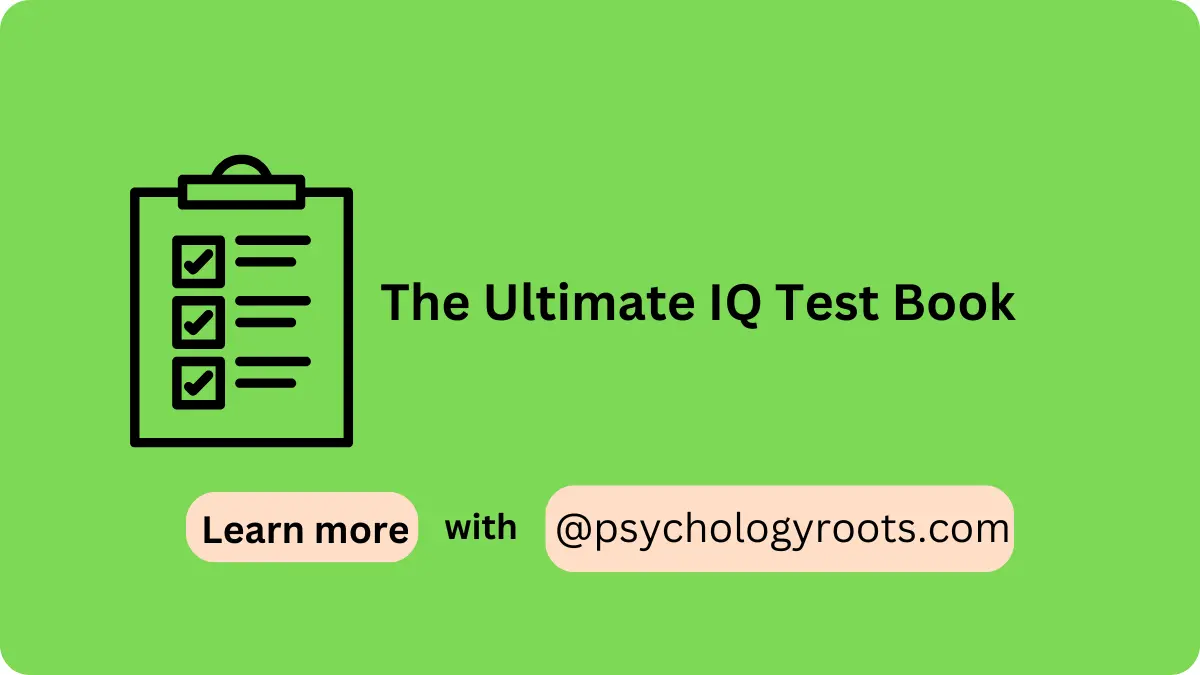Table of Contents
The Ultimate IQ Test Book
Here in this post, we are sharing the “The Ultimate IQ Test Book”. You can read psychometric and Author information. We have thousands of Scales and questionnaires in our collection (See Scales and Questionnaires). You can demand us any scale and questionnaires related to psychology through our community, and we will provide you with a short time. Keep visiting Psychology Roots.
About The Ultimate IQ Test Book
Scale Name
The Ultimate IQ Test Book
Author Details
Philip Carter and Ken Russell
Translation Availability
English

Background/Description
The Ultimate IQ Test Book: 1,000 Practice Test Questions to Boost Your Brain Power is a comprehensive collection of IQ practice tests designed to enhance cognitive abilities and prepare individuals for formal intelligence assessments. Authored by Philip Carter and Ken Russell, both renowned UK IQ test experts, the book was first published in 2007 by Kogan Page. It contains 1,000 practice questions organized into 25 tests, each with 40 questions, covering verbal, numerical, diagrammatic reasoning, logical reasoning, and lateral thinking. The book aims to improve vocabulary, calculation skills, and logical reasoning, making it valuable for those facing IQ tests in recruitment (e.g., government, armed forces, education, or commerce) or seeking mental stimulation for personal enrichment.
Unlike standardized IQ tests, the book’s tests are not normed, so they do not provide an actual IQ score. However, they include a guide to assess individual performance, with answers and explanations to facilitate learning. The questions are designed to be more challenging than typical IQ tests, with some requiring written responses rather than multiple-choice answers, which may enhance cognitive rigor but differ from standard formats. User reviews highlight its appeal for gifted students and puzzle enthusiasts, noting its addictive quality and ability to sharpen mental acuity, though some critique unclear questions or incomplete explanations. The book’s broad applicability and engaging format make it a popular tool for cognitive training.
Psychologists and educators may use The Ultimate IQ Test Book as a supplementary resource to develop cognitive skills or prepare individuals for psychometric testing. While not a clinical diagnostic tool, it supports cognitive enhancement and test familiarity, benefiting both professional and recreational users. Its English-only availability limits global reach, but its robust design ensures utility in English-speaking contexts.
Administration, Scoring and Interpretation
- Obtain a copy of The Ultimate IQ Test Book from a reputable source, such as Kogan Page, Amazon, or authorized booksellers, ensuring ethical use.
- Explain the purpose to the respondent, noting that it provides practice for IQ-style questions to enhance cognitive skills or prepare for tests, emphasizing its non-standardized nature.
- Provide instructions, asking the respondent to complete one or more of the 25 tests (40 questions each), following the book’s guidelines, typically under timed conditions (e.g., 30-40 minutes per test) to simulate real testing.
- Approximate time for completion is 30-40 minutes per test, or 5-10 minutes for selected sections, depending on the user’s goals.
- Administer in a quiet, distraction-free setting, using the book’s paper format or digital versions (e.g., Kindle), ensuring access to answers and explanations for review.
Reliability and Validity
Specific psychometric data for The Ultimate IQ Test Book is limited, as it is not a standardized clinical tool but a practice resource. The book’s introduction acknowledges that its tests are not normed, precluding formal IQ assessment. Internal consistency is not explicitly reported, but the variety of question types (verbal, numerical, diagrammatic) suggests moderate coherence based on user feedback praising question diversity. Test-retest reliability is also undocumented, though consistent practice is reported to improve performance, implying stability in difficulty.
Convergent validity is supported by user reports comparing the book’s questions to actual IQ tests, with similar verbal, numerical, and logical reasoning challenges. However, some users note the tests are harder than professional IQ tests, with written-answer formats differing from multiple-choice standards, potentially limiting direct comparability. Discriminant validity is less relevant, as the book focuses on general cognitive skills rather than specific constructs. Criterion validity is evidenced by its reported utility in preparing for real IQ tests, with users claiming improved test performance after practice, though some questions are criticized for ambiguity or poor explanations (e.g., 35% of answers lack clear rationale). Despite these limitations, the book’s design by IQ test experts and positive user feedback affirm its value for cognitive training.
Available Versions
Multiple-Items
Reference
Carter, P. J., Russell, K., & Russell, K. A. (2007). The Ultimate IQ Test Book. Kogan Page Publishers.
Important Link
Scale File:
Frequently Asked Questions
What does The Ultimate IQ Test Book measure?
It provides practice for verbal, numerical, and logical reasoning skills, not a formal IQ score.
Who can use the book?
Anyone preparing for IQ tests or seeking cognitive challenges, including students, professionals, and puzzle enthusiasts.
How long does a test take to complete?
About 30-40 minutes per 40-question test.
Is the book suitable for clinical IQ assessment?
No, it’s for practice only, as it’s not standardized.
Can it improve cognitive skills?
Yes, users report enhanced vocabulary, calculation, and reasoning with regular practice.
Disclaimer
Please note that Psychology Roots does not have the right to grant permission for the use of any psychological scales or assessments listed on its website. To use any scale or assessment, you must obtain permission directly from the author or translator of the tool. Psychology Roots provides information about various tools and their administration procedures, but it is your responsibility to obtain proper permissions before using any scale or assessment. If you need further information about an author’s contact details, please submit a query to the Psychology Roots team.
Help Us Improve This Article
Have you discovered an inaccuracy? We put out great effort to give accurate and scientifically trustworthy information to our readers. Please notify us if you discover any typographical or grammatical errors.
Make a comment. We acknowledge and appreciate your efforts.
Share With Us
If you have any scale or any material related to psychology kindly share it with us at psychologyroots@gmail.com. We help others on behalf of you.